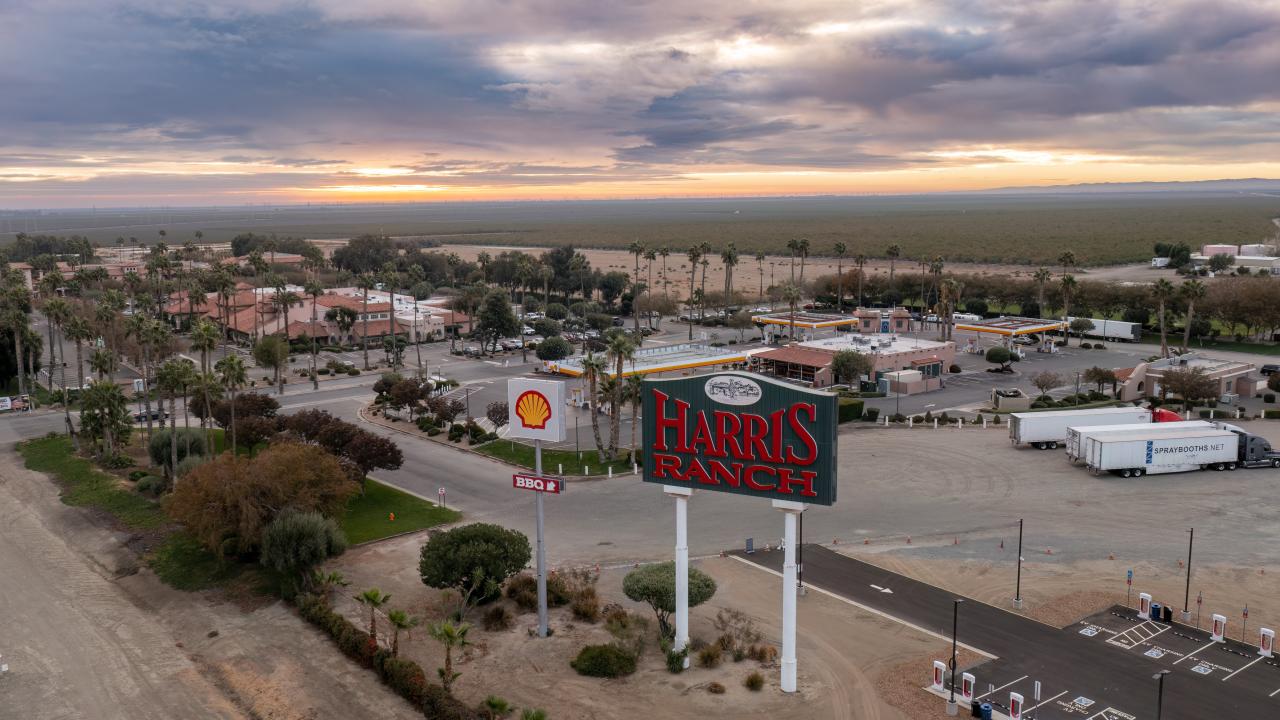
California Loses Agricultural Legend
John Harris, a respected farmer and cattle rancher passed away on Wednesday, July 2, at the age of 81. As the longtime leader of Harris Farms, he played a pivotal role in shaping agriculture in California’s San Joaquin Valley and beyond. Under his guidance, Harris Farms became one of the most prominent integrated farming and beef operations in the western United States, known for its quality and deep commitment to land stewardship.
From his famed Harris Ranch Resort near Interstate 5 to his sprawling 800-acre feed lot with more than 100,000 head of cattle, Harris was one of the original titans of California agriculture.
Despite his deep roots in traditional ranching, Harris could be open to innovation—willing to try new tools and technologies if they help him steward the land better and improve animal welfare.
Such was the case when CLEAR Center Director Dr. Frank Mitloehner met Harris back when he first began his career at the University of California, Davis.
“I met with him, and he was super open and interested in what I did,” Dr. Mitloehner recalled.
Dr. Mitloehner spoke to Harris about his research regarding adding shade for cattle in feedlots to reduce heat stress. Skeptical at first, Harris listened and did his own testing, based upon Dr. Mitloehner’s research: installing shade over four of his cattle pens and then comparing the cattle in four pens that were not shaded. His finding confirmed what Dr. Mitloehner had said: that the shaded cattle were less stressed and in turn, performed better. And two years later, the entire feedlot at Harris Ranch was shaded.
“What set him apart from anybody is how much people respected him,” Mitloehner said. “Everybody knew him and valued him and so forth. One of the main points of his legacy is that he made sure that he listened to people who were experts in their respective fields.”
From there, the two developed a friendship built on respect and trust. When Dr. Mitloehner wanted to have an air quality summit with the beef feedlot industry, it was Harris that spearheaded the endeavor.
“He said, that’s a good idea and called all of his friends in the beef feedlot industry and invited all of them to this summit to learn what we do as researchers,” Mitloehner recalled. “And we had the first ever Beef Feedlot Air Quality Summit in the Animal Science Department here at UC Davis and the entire feed lot industry was here—and they loved it. And that’s how I broke into the industry because the research I did was practical and relevant to what they did—research that made a difference to them.”
Dr. Mitloehner added that, “Mr. Harris always had a lot of trust in the work we do and was very supportive.”
Over the years, Harris Ranch embraced innovation and sustainable practices to ensure a better future for both its business and the industry. Harris believed that raising cattle and environmental stewardship go hand-in-hand. And he was strong in his conviction that the land is not just where cattle is raised, but it’s also where you can build a future for the generations that come after us.
Ryan Jacobsen, CEO of the Fresno County Farm Bureau, who has dedicated 21 years of service to the Central Valley’s agricultural industry, considered Harris both a mentor and friend.
“We have lost a true agvocate, but his legacy will continue to shape and inspire generations of agricultural leaders,” Jacobsen said. “I’m deeply grateful to have known and worked with him and for the lessons he so generously shared.”
Harris was born in 1943 and grew up in Fresno County, attending local schools and eventually earning a degree in agricultural production from UC Davis.
Harris took ownership of Harris Farms after his father’s death in 1981. He led the ranch for decades, including the Harris Ranch Inn and Restaurant, the Harris Ranch Beef Company, the Harris Ranch Feeding Company and the Harris Ranch Farms Horse Division and Harris Fresh. The Harris Feeding Company and Harris Ranch Beef Company were sold to Central Valley Meats in 2019.
Harris’s leadership, vision, and passion for farming left an indelible mark on California agriculture—and on everyone who had the privilege of working with him.
Ken Zeman, who has worked at the Harris Ranch Feeding Company since 1997, put it simply, “Harris Ranch was the California agricultural dynasty.”
Adding, “Mr. Harris was a good person to work for, and I was honored to work for him.”
Along with his passion for beef, Harris developed an expertise at raising thoroughbreds. He was chairman of the California Horse Racing Board, and his farms foaled and raised 2014 Kentucky Derby winner California Chrome.
But it was the cattle and specifically the ranch that Harris is most well-known for. Harris Ranch is one of California’s largest and most well-known beef producers. With a vertically integrated operation that includes cattle feeding, beef processing, and branded beef products, Harris Ranch plays a key role in supplying high-quality beef while emphasizing animal welfare, sustainability, and responsible land stewardship.
According to the company website, beyond his professional achievements, Mr. Harris had an unwavering passion for helping people and supporting his local community. Whether through mentorship or quiet acts of kindness, he consistently uplifted others and believed in giving back to the region and industry that shaped him.
“John Harris was a cornerstone of California agriculture—an innovator, a steadfast advocate for the Valley, a steward of the land and its people,” Jacobsen said. “And he was a generous philanthropist who gave freely of his time, talents, and resources.”
In addition to its role in beef production, Harris Ranch is also a popular stopover and tourist destination along California’s I-5 corridor. The Harris Ranch Inn & Restaurant offers travelers a chance to enjoy locally raised beef, stay overnight in a Western-style hotel, and explore the ranch’s farm-to-table menu. With its signature restaurant, bakery, and country store, it’s a unique blend of agriculture and hospitality that draws visitors from across the world to take a taste of what California agriculture has to offer.
“Though widely known across the region, John remained remarkably grounded,” Jacobsen said. “He cared deeply about the well-being of all farmers and farm employees, and he never stopped fighting for the economic sustainability of California agriculture.”
